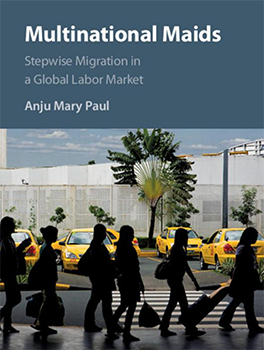Multinational Maids: Stepwise Migration in a Global Labor Market
“What drove these stepwise migrants was what propelled them to leave their home country in the first place: the hope for something better”

“Multinational Maids” Highlights the Resilience of Domestic Workers
by Catherine Brist, PhD Candidate in English & Women’s and Gender Studies
Over the past two years, COVID-19 has disrupted schools and childcare, prompting a national conversation about the importance of caregivers. At the same time, the pandemic has vividly illustrated the interconnectedness of our globalized world. Although published several years before “coronavirus” entered our everyday vocabulary, Dr. Anju Paul’s Multinational Maids: Stepwise Migration in a Global Labor Market considers issues surrounding caregiving and globalization through an exploration of the lives of Filipino and Indonesian domestic workers who work internationally. A CEW+ Scholar and U-M alumna, Paul emphasizes the determination and resilience of migrant domestic workers as they navigate the challenges of international labor.
Paul proposes the term “stepwise international labor migration” to describe the travel patterns of the women she studies. Because they don’t have the capital or resources to immediately move to their preferred destination country, these migrant domestic workers typically make several moves, each one representing an incremental step toward their ultimate goal destination. As they move, they “leverage the information, resources, and connections they acquire” to find better jobs in new locations (2). Because this migration pattern is widespread, understanding it is key to supporting domestic workers worldwide.
Paul incorporates quotes from the migrant workers she interviews throughout the book, and their voices are especially compelling. Although many women describe experiences of mistreatment and abuse, Paul handles their stories with care, emphasizing the challenges they face as well as their ingenuity in responding to those challenges. As Paul notes, “the prevailing discourse around migrant domestic workers more often highlights the vulnerability of their lives and the marginality of their positions” (1). However, the women Paul interviews also view travel as an opportunity to control their lives. Paul writes, “What drove these stepwise migrants was what propelled them to leave their home country in the first place: the hope for something better” (52).
By illuminating the stories of migrant domestic workers, Paul hopes to make their experiences visible to academics and policymakers and to emphasize the significance of domestic labor around the world. In fact, the International Labor Organization estimates that 7.5 percent of working women in the world are domestic workers (15). Although Multinational Maids discusses the United States only briefly, Paul notes that domestic workers in the U.S. also face difficult working conditions. For example, Paul explains that domestic workers in the United States typically have “live-out” arrangements and work for multiple employers at a time, a situation that gives them greater personal freedom than live-in workers in other countries. However, they receive few labor protections: only ten U.S. states have passed a “Domestic Workers’ Bill of Rights,” which guarantees protections such as overtime pay and a weekly day of rest.
Written in accessible and engaging language, Paul’s book will be useful to anyone interested in domestic labor or international migration. As she uplifts the voices of workers who are often overlooked, Paul invites us to witness the complexity of these women’s lives and imagine a world where the value of their labor will be recognized by all.
CEW+ is proud to have supported Dr. Paul’s dissertation research with a Mary Malcomson Raphael Scholarship in 2010. To donate to a CEW+ scholarship fund, contact Alicia Marting at [email protected] or visit the CEW+ giving page at cew.umich.edu/give.
Multinational Maids: Stepwise Migration in a Global Labor Market by Anju Mary Paul. Cambridge, Cambridge University Press, 2017. 386 pgs. $34.99 paperback.
Author Bio: Catherine Brist is a PhD Candidate in English & Women’s and Gender Studies at U-M, a 2022 Hopwood Award winner, and a writer for CEW+. Her dissertation research focuses on the reception of contemporary trauma narratives.

